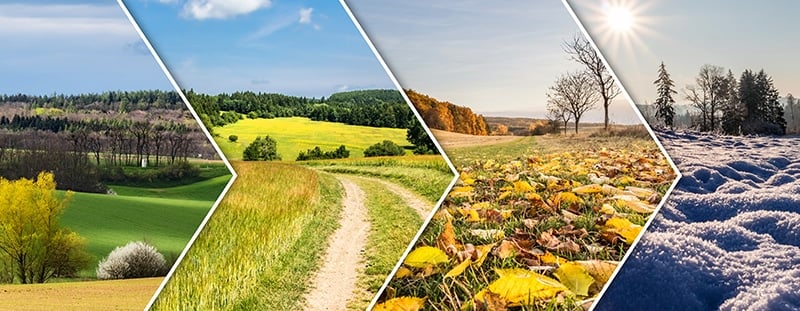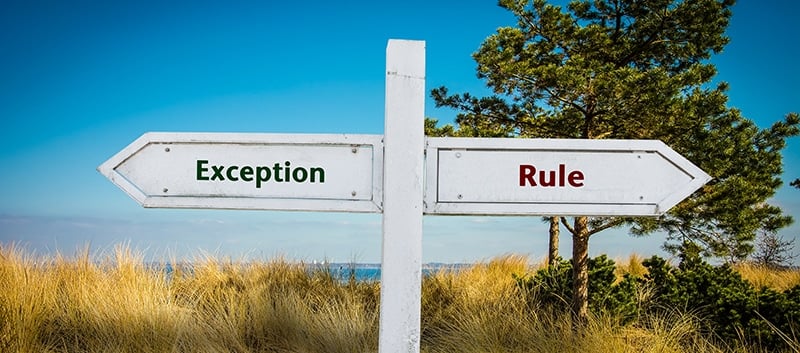Unlike months and days, the names of seasons are not always capitalized. However, every now and again, you could come across the name of a season capitalized in a sentence, leaving you scratching your heads over what warranted the capitalization.
The names of different seasons in the year are not capitalized because they are general nouns and not proper names. However, there are some exceptions that require the capitalization to take effect – such as when the season name is the first word in a sentence, a name, or part of a proper noun.
Let’s take a deeper look at the capitalization rules that apply to the names of seasons.

Are Seasons Capitalized?
The seasons – summer, fall, spring, and winter – need not be capitalized regardless of whether they are used as adjectives or nouns. Unlike people who capitalize these nouns assuming they are proper nouns, names of the seasons in a year are general nouns and, therefore, do not need capitalization.
Different style guides exist for writing – namely, The Associated Press Stylebook, MLA Handbook, and The Chicago Manual of Style. The capitalization rules for the names of seasons are the same across these styles.
Why Seasons Aren’t Capitalized, But Days and Months Are?
Why are the names of days and months capitalized? Take, for example, this sentence: The winter solstice typically takes place during December every year. In the sentence, the season ‘winter’ is not capitalized, but the month ‘December’ is. Why?
Truth be told, there is no proper rulebook explaining why seasons are not capitalized and months and days are capitalized even when there are more months in a year and days in a week than the number of seasons.
Names of months and days should be capitalized, even when they are abbreviated. Names of holidays – such as Christmas, Ramadan, Easter, Thanksgiving, etc. – are also capitalized, but not seasons.
Names of seasons are considered general nouns, and the capitalization rules that apply to common nouns apply to them too, even though they denote specific time periods like names of days and months do. It is quite similar to how ‘midnight’ or ‘noon’ denote specific times but don’t get the capitalization treatment.
There are a few exceptions to this capitalization rule, however.

Exceptions: When to Capitalize Seasons?
There are instances when it’s okay to capitalize the names of seasons.
Opening Word of a Sentence
Like every other word that opens a sentence, season names are capitalized when they are the opening word in a sentence. For example, ‘Summer shopping can be fun as it’s pleasant outside, unlike during winter.’ In this sentence, ‘summer’ was capitalized as it opened the sentence. However, the mention of another season, ‘winter’ is in lowercase.
Further Reading: Is “High School” Capitalized? When to Capitalize It
Denotes Something
Names of specific places, individuals, or things are usually capitalized. For example, ‘tower’ is a common noun and doesn’t require capitalization. However, when it’s part of the name of a place, such as the Eiffel Tower, it’s capitalized. Similarly, seasons are capitalized when they are a part of a title or are proper nouns, such as the Winter Olympics or Rachel Carson’s Silent Spring.
Winter Olympics gets the capitalization treatment as it is an event’s formal name. The phrase ‘winter sports’, however, usually isn’t capitalized because it’s basically descriptive or not the name of anything particular. Fall Semester 2012 is also capitalized as it is an actual semester’s name. But the “fall schedule” is not and is, therefore, written in lowercase.
On a related note, if someone goes by the name Spring or Summer, the proper name capitalization rule shall take effect there too.
The Personification of Seasons in Poetry
Poets tend to capitalize names of seasons in their literary texts as if the seasons were actual people. An example sentence would be: Receiving Winter’s kiss. Another example, ‘Summer almost done, Autumn surge late.’
Having said that, poems could have lines that personify a season or an inanimate thing or word but may not capitalize the word. Like in this sentence, for example, ‘Lingering with winter on a branch plume’.
Personifying seasons is not conventional grammar. Such personification of seasons, therefore, should be restricted only to poetry and not regular language – certainly not in a business document – even if the speaker claims to be extremely poetic.
In the Title
Names of seasons are also capitalized when they are part of a title of a text, such as an article or a sub-topic in a book. For example, ‘The Best Winter Shopping Days for 2018’ has ‘summer’ in capital as every other word in the sentence is capitalized – except for the word ‘for’ since it’s a preposition. If the title was in lower case – such as ‘The best winter shopping days for 2018’, the word ‘summer’ would also be in small letters.

General Capitalization Rules in the English Language
English capitalization rules look simple at first. However, when you dig deep, you learn it’s more than just capitalizing proper nouns, the opening word of a sentence, etc. The first word after a colon should also be capitalized or maybe not – the jury is still out on that. A lot of the capitalization rules in English depend on context.
Let’s take a look at some of the basic capitalization rules in English. These are in addition to the rules that state first words in a sentence and proper nouns should be capitalized.
No Capitalization After a Colon
Usually, a word right after a colon is not capitalized. For example, ‘My favorite pleasure food: ice cream.’ However, there are a few exceptions to this rule. If the word following a colon is a name or proper noun, it is capitalized. For instance, ‘The fashion capital of the world: Paris.’
Another exception is the word immediately after the colon is a part of a proper sentence. For example, “The final verdict: The iPhone 11 Pro is the best iPhone yet.”
First Word in a Quote Should Be Capitalized (Not Always)
If a particular quote is a proper sentence, its first word should be capitalized. Example sentence: Jim opined, “Smartphones are losing their charm.”
However, if the quote is an incomplete sentence or just a phrase, the first word need not be capitalized. For instance: Michael said he isn’t “fit enough” to play the sport.
Most Words in a Title Should Be Capitalized
The capitalization rules that apply to titles of movies, books, etc. marginally vary based on the writing style guide they conform to. Generally, the first word in a title is always capitalized – even if they are verbs or adjectives.
If the title has an article, conjunction, or preposition, those should be lowercased. However, if the preposition or conjunction has more than five letters, it can be capitalized.
Cities, Nationalities, and Languages Should Be Capitalized
The names of languages, nationalities, countries, and cities are proper nouns and should, therefore, be capitalized. Example sentence: Latin has contributed significantly to the English language.
Events and Time Periods Must Be Capitalized (At Times)
Specific eras, periods, historical events, etc. are proper nouns and must be capitalized. The First World War is a proper name that denotes a historical event. The term ‘world war’, however, is a generic term that could denote the First World War, Second World War, or be descriptive of the global conflict in general. It’s capitalized in the name ‘The First World War’ because it’s part of a name.
Depending on what the term denotes or how it’s used in a sentence, it could be in title case or small letters. Sentence with capitalization: Most veterans of the First World War are now dead. Sentence without capitalization: A world war takes place when global powers engage in a military war.
Also, if the time period is a general noun, it need not be capitalized. For example, ‘During the sixteenth century, the English empire blossomed.’

Can Names of Seasons Ever Get Treated as Proper Nouns?
Technically speaking, ‘season’ is a common noun. The different seasons ‘summer’, ‘winter’, ‘autumn’, etc. should be proper nouns. But they are not treated as one. However, there are possibilities these names of seasons could be considered as proper nouns and, therefore, get the capitalization treatment.
English is an evolving language. Its grammar rules change and new words get added to its dictionary every year. For example, the word “bootylicious”, which means sexually attractive, was originally considered a ‘slang term’. It was first used by Snoop Dogg, the famous rapper, in his song in 1992. The word spread and it became so popular it made its way into the Oxford English Dictionary in 2004.
Similarly, the terms the ‘internet’ and the ‘web’ were originally capitalized. The capitalized word ‘Web’ was used as shorthand for the term ‘World Wide Web’. The words, thanks to their widespread usage, have now metamorphosed into common nouns and are not capitalized as a result.
Conclusion
The English Language isn’t the oldest in the world, but it has been around for quite some time and has constantly evolved over the years. The language has given the world great quotes and sayings. But if you try to dissect the language or find the reasoning behind why certain phrases or words are mentioned the way they are, not much sense will prevail.
Long story short, do not capitalize season names if the “rules of exception” mentioned above aren’t applicable or the seasons are a part of regular sentences.
Shawn Manaher is the founder and CEO of The Content Authority. He’s one part content manager, one part writing ninja organizer, and two parts leader of top content creators. You don’t even want to know what he calls pancakes.

